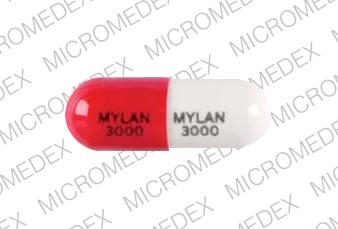Meclofenamate Side Effects
Medically reviewed by Drugs.com. Last updated on May 21, 2023.
Applies to meclofenamate: oral capsule.
Warning
Oral route (Capsule)
Cardiovascular Thrombotic EventsNonsteroidal anti-inflammatory drugs (NSAIDs) cause an increased risk of serious cardiovascular thrombotic events, including myocardial infarction and stroke, which can be fatal. This risk may occur early in treatment and may increase with duration of use.Meclofenamate sodium capsules are contraindicated in the setting of coronary artery bypass graft (CABG) surgery.Gastrointestinal RiskNSAIDs cause an increased risk of serious gastrointestinal adverse events including bleeding, ulceration, and perforation of the stomach or intestines, which can be fatal. These events can occur at any time during use and without warning symptoms. Elderly patients are at greater risk for serious gastrointestinal events.
Serious side effects of Meclofenamate
Along with its needed effects, meclofenamate may cause some unwanted effects. Although not all of these side effects may occur, if they do occur they may need medical attention.
Check with your doctor immediately if any of the following side effects occur while taking meclofenamate:
More common
- Diarrhea
- indigestion
- loss of appetite
- nausea
- passing of gas
- stomach pain, fullness, or discomfort
- swelling
- vomiting
Less common
- Black, tarry stools
- blood in vomit
- constipation
- dizziness
- headache
Rare
- Back or leg pain
- bleeding gums
- blistering, peeling, or loosening of the skin
- bloating
- bloody nose
- bloody urine or stools
- blurred vision
- burning, crawling, itching, numbness, prickling, "pins and needles" , or tingling feelings
- change in vision
- chills
- cough or hoarseness
- dark urine
- decreased amount of urine
- discouragement
- fast, irregular, pounding, or racing heartbeat or pulse
- feeling of discomfort
- feeling sad or empty
- fever
- general body welling
- heavier menstrual periods
- increased blood pressure
- increased thirst
- increased urge to urinate during the night
- inflammation of the joints
- irritability
- itching
- joint or muscle pain
- loss of appetite
- loss of interest or pleasure
- lower back or side pain
- painful or difficult urination
- pale skin
- pinpoint red spots on the skin
- red, irritated eyes
- red skin lesions, often with a purple center
- sore throat
- sores, ulcers, or white spots in the mouth
- stomach cramps or tenderness
- swelling of the face, fingers, or lower legs
- swollen glands
- trouble breathing
- trouble concentrating
- trouble sleeping
- unusual bleeding or bruising
- unusual tiredness or weakness
- vomiting of blood or material that looks like coffee grounds
- waking to urinate at night
- watery or bloody diarrhea
- weight gain
- yellowing of the eyes or skin
Other side effects of Meclofenamate
Some side effects of meclofenamate may occur that usually do not need medical attention. These side effects may go away during treatment as your body adjusts to the medicine. Also, your health care professional may be able to tell you about ways to prevent or reduce some of these side effects.
Check with your health care professional if any of the following side effects continue or are bothersome or if you have any questions about them:
Less common
- Continuing ringing or buzzing or other unexplained noise in ears
- excess air or gas in the stomach or intestines
- full feeling
- hearing loss
- swelling or inflammation of the mouth
- weight loss
Rare
- Bad unusual or unpleasant (after) taste
- burning, dry, or itching eyes
- change in taste
- decreased vision
- discharge, excessive tearing
- hair loss
- pain in the ankles or knees
- painful, red lumps under the skin, mostly on the legs
- redness, pain, swelling of the eye, eyelid, or inner lining of eyelid
- reversible loss of color vision
- sensitivity to light
- temporary loss of vision
- throbbing pain
For Healthcare Professionals
Applies to meclofenamate: compounding powder, oral capsule.
General
The most frequently reported side effects were gastrointestinal in nature and included diarrhea, nausea with or without vomiting, and abdominal pain.[Ref]
Gastrointestinal
Very common (10% or more): Diarrhea (up to 33%), nausea (11%)
Common (1% to 10%): Vomiting, abdominal pain, pyrosis, flatulence, constipation, stomatitis, peptic ulcer
Frequency not reported: Colitis, bleeding, perforation, ulcer, paralytic ileus[Ref]
Dermatologic
Common (1% to 10%): Rash, urticaria, pruritus
Frequency not reported: Erythema multiforme, Stevens-Johnson syndrome, exfoliative dermatitis, erythema nodosum, hair loss[Ref]
Nervous system
Common (1% to 10%): Headache, dizziness
Frequency not reported: Paresthesia, taste disturbance[Ref]
Other
Common (1% to 10%): Edema, tinnitus
Frequency not reported: Malaise, fatigue[Ref]
Cardiovascular
Frequency not reported: Palpitations[Ref]
Hematologic
Frequency not reported: Neutropenia, thrombocytopenic purpura, leukopenia, agranulocytosis, hemolytic anemia, eosinophilia, hemoglobin decreased, hematocrit decreased[Ref]
Hepatic
Frequency not reported: Liver function tests abnormal, cholestatic jaundice[Ref]
Renal
Frequency not reported: Renal failure[Ref]
Metabolic
Common (1% to 10%): Anorexia[Ref]
Ocular
Frequency not reported: Vision blurred, visual acuity decreased, temporary vision loss, reversible color vision loss, macular fibrosis, macular edema, perimacular edema, conjunctivitis, iritis[Ref]
Psychiatric
Frequency not reported: Depression, insomnia[Ref]
Genitourinary
Frequency not reported: Nocturia[Ref]
Musculoskeletal
Frequency not reported: Lupus-like syndrome[Ref]
Immunologic
Frequency not reported: Serum sickness-like syndrome
More about meclofenamate
- Check interactions
- Compare alternatives
- Pricing & coupons
- Reviews (2)
- Drug images
- Latest FDA alerts (1)
- Side effects
- Dosage information
- During pregnancy
- Drug class: Nonsteroidal anti-inflammatory drugs
- Breastfeeding
- En español
Patient resources
Professional resources
Related treatment guides
References
1. Product Information. Meclofenamate Sodium (meclofenamate). Mylan Pharmaceuticals Inc. 2012.
Further information
Always consult your healthcare provider to ensure the information displayed on this page applies to your personal circumstances.
Some side effects may not be reported. You may report them to the FDA.

